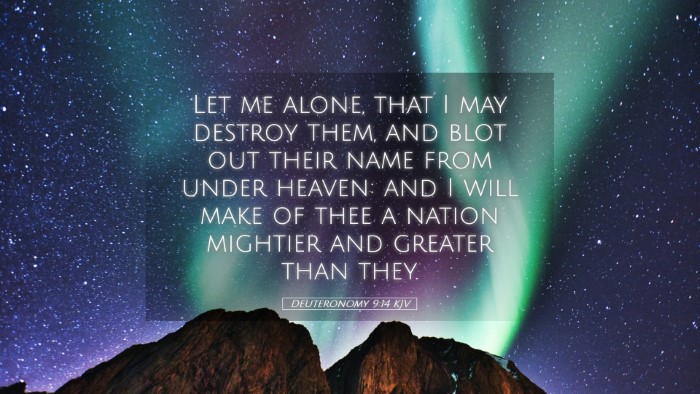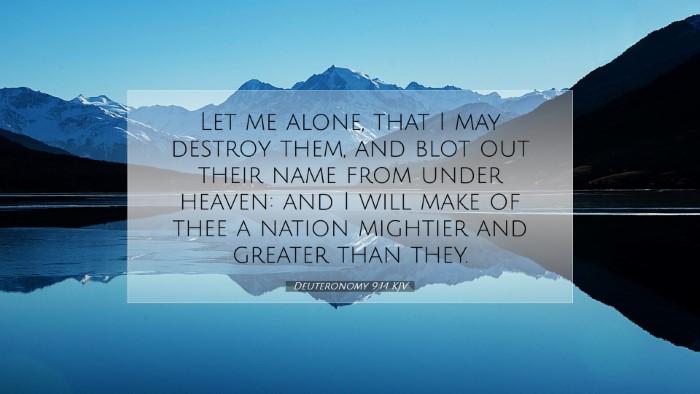Commentary on Deuteronomy 9:14
Verse (Deuteronomy 9:14, KJV): "Let me alone, that I may destroy them, and blot out their name from under heaven: and I will make of thee a nation mightier and greater than they."
Contextual Overview
The verse occurs within a critical section of Deuteronomy where Moses recalls the events of Israel's disobedience and God's response. This particular verse reflects a moment when God, in His anger against Israel's persistent sinfulness, communicates His intent to obliterate the nation due to their idolatry and rebellion.
Theological Insights
This verse illustrates not only the severity of God's judgment but also highlights His authority over the nation of Israel. The phrase "Let me alone" indicates a moment of divine deliberation regarding the fate of Israel, revealing the intense emotional and relational dynamic between God, Moses, and the people.
Moses' Intercession
Moses stands as a mediator, pleading for the Israelites. Commentators like Albert Barnes emphasize Moses' role as a typological Christ, who intercedes on behalf of his people, reflecting God's merciful nature even in judgment.
God's Sovereignty
In this moment, God's sovereignty shines through His decision-making power. Matthew Henry points out that while God expresses a desire to destroy, it is ultimately Moses' faithful intercession that relents God's wrath. This interplay exhibits God's justice alongside His mercy.
Commentary Breakdown
1. God's Judgment and Anger
God's anger is a significant theme addressed by Adam Clarke, who notes that His anger was roused due to the great provocation of the people through their idolatrous practices. Clarke elaborates that Israel's sin was deeply rooted, and their actions warranted divine retribution, highlighting the seriousness with which God views disobedience.
2. The Role of Intercession
The act of intercession by Moses is critical in understanding the dynamics of this passage. Matthew Henry discusses how Moses, aware of the covenantal promises made to Abraham, Isaac, and Jacob, appeals to God's faithfulness. This raises questions about human agency in theological discourse, emphasizing the partnership between divine sovereignty and human responsiveness.
- The Nature of Intercession: It demonstrates humility, love for God's people, and a deep understanding of God's covenant.
- The Power of Prayer: Moses' prayer indicates that prayer can influence God's decisions, showcasing the transformative nature of genuine intercession.
3. The Promise of a Greater Nation
God's offer to create a greater nation from Moses is significant. Albert Barnes suggests that this proposal serves to test Moses' resolve and loyalty. It highlights God's capacity to fulfill His covenant through different means, yet Moses' response shows his dedication to the people of Israel over personal glory.
Lessons for Today
This verse provides several essential lessons for contemporary believers:
- Understanding Sin: The severity of Israel's sin serves as a cautionary tale about the nature of rebellion against God.
- The Importance of Mediation: Moses as a mediator foreshadows Christ’s ultimate intercession, emphasizing the necessity of seeking reconciliation.
- The Consequences of Disobedience: It reminds us that disobedience can lead to severe consequences, prompting self-examination within the Church.
- God's Mercy in Judgment: The interplay of judgment and mercy reveals God's character, encouraging believers to trust in His grace amidst judgment.
Conclusion
Deuteronomy 9:14 encapsulates profound theological truths about sin, intercession, and divine mercy. Through the lens of Moses' intercession and God's judgment, we gain insight into the complexities of God's relational dynamics with humanity. The reflections by Matthew Henry, Albert Barnes, and Adam Clarke provide a rich tapestry for understanding this pivotal moment in Israel's journey.


